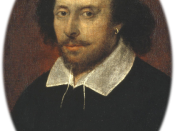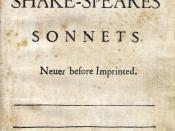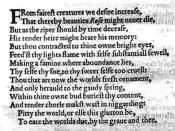September 28, 1993
A Not-Too-Critical-Essay of Shakespeare's Sonnet Number 126
Shakespeare's sonnets, as poems, have been obscured by the enormous amount of speculation, much of it unjustified, that has grown up around the problems presented by the dedication. The following sonnet is commonly grouped with 125 others that are believed to have been written to a much admired young man, who was Shakespeare's junior in both years and social status.
The form in which the poem is written is often referred to as Shakespearean or English form. As in most of Shakespeare's sonnets the argument proceeds by quatrains. Each quatrain presents an idea in itself. The poet in the first quatrain bewails his own lot; in the second contrasts that lot with other men's; in the third, thinking of his beloved friend, he rises like the lark that "sings hymns at heaven's gate"; and in the couplet his happiness is generalized in a final contrast.
To elaborate on what I have just said seems unnecessary but one must assume that one's audience is completely stupid, thus the elaboration. In the first line the poet speaks of himself as being out of luck, and/or money and not well received by his fellow man. He has taken to crying about his social ostracism in line two. In an attempt to clarify for himself why he is in such a state he "troubles" heaven with his "bootless" or useless cries. But as the poet has made clear heaven turns a deaf ear and no response is forthcoming. Again he becomes introspective and curses his fate. This first quatrain has given us an image of a grown man "down and out" if you will, who is accepting no responsibility for his life's station.
By the second quatrain the poet has taken to wishing he...


